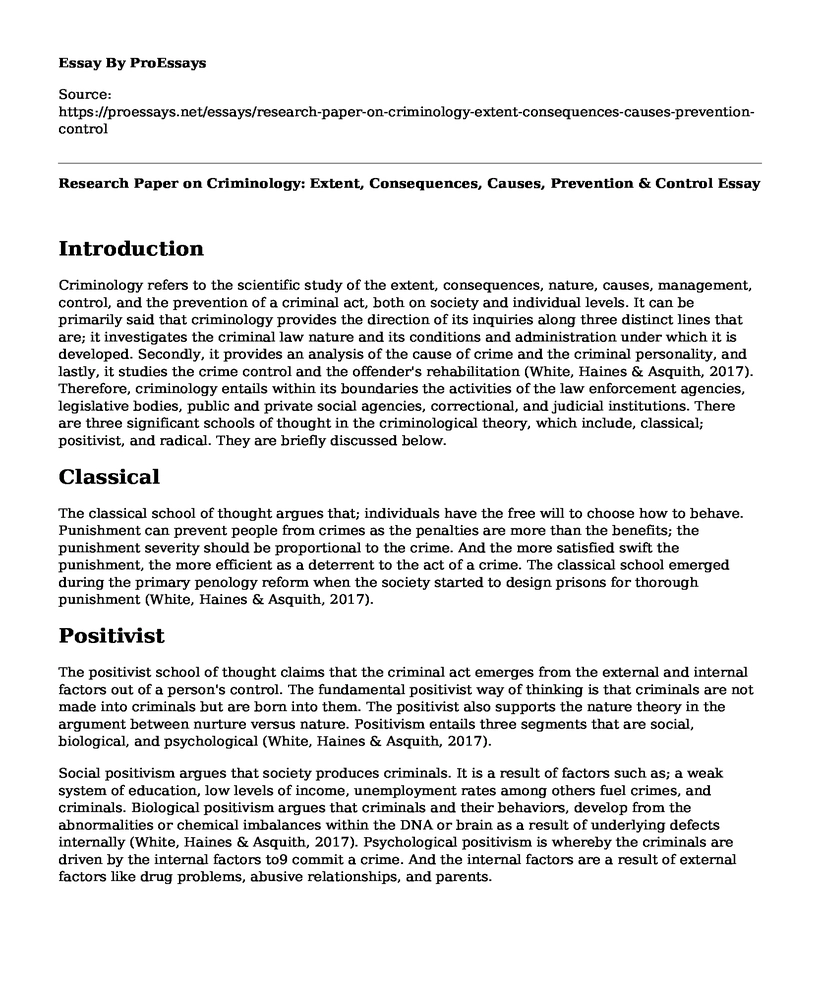Introduction
Criminology refers to the scientific study of the extent, consequences, nature, causes, management, control, and the prevention of a criminal act, both on society and individual levels. It can be primarily said that criminology provides the direction of its inquiries along three distinct lines that are; it investigates the criminal law nature and its conditions and administration under which it is developed. Secondly, it provides an analysis of the cause of crime and the criminal personality, and lastly, it studies the crime control and the offender's rehabilitation (White, Haines & Asquith, 2017). Therefore, criminology entails within its boundaries the activities of the law enforcement agencies, legislative bodies, public and private social agencies, correctional, and judicial institutions. There are three significant schools of thought in the criminological theory, which include, classical; positivist, and radical. They are briefly discussed below.
Classical
The classical school of thought argues that; individuals have the free will to choose how to behave. Punishment can prevent people from crimes as the penalties are more than the benefits; the punishment severity should be proportional to the crime. And the more satisfied swift the punishment, the more efficient as a deterrent to the act of a crime. The classical school emerged during the primary penology reform when the society started to design prisons for thorough punishment (White, Haines & Asquith, 2017).
Positivist
The positivist school of thought claims that the criminal act emerges from the external and internal factors out of a person's control. The fundamental positivist way of thinking is that criminals are not made into criminals but are born into them. The positivist also supports the nature theory in the argument between nurture versus nature. Positivism entails three segments that are social, biological, and psychological (White, Haines & Asquith, 2017).
Social positivism argues that society produces criminals. It is a result of factors such as; a weak system of education, low levels of income, unemployment rates among others fuel crimes, and criminals. Biological positivism argues that criminals and their behaviors, develop from the abnormalities or chemical imbalances within the DNA or brain as a result of underlying defects internally (White, Haines & Asquith, 2017). Psychological positivism is whereby the criminals are driven by the internal factors to9 commit a crime. And the internal factors are a result of external factors like drug problems, abusive relationships, and parents.
Radical
The radical school of thought claims that the only means of solving crime problems is to overthrow the system of capitalism from which the crime originates. It posits that the current system of criminal justice tends to serve only the ruling class interests, thus contribute to the inequality in society. The radical school states that the function of the community in terms of the overall interest of the ruling class instead of the whole society always results in the potential conflict (White, Haines & Asquith, 2017).
Feminist Theories of Criminology
The feminist theories entail the group of approaches that are related and share different universal principles. To begin with, the feminist theory holds that constructed expectations of the society regarding the behavior and the attitude of men and women are the organizing component of the central social life, including the justice processing of the criminal, criminal offending, and victimization. Secondly, feminism theory persists that valuing of masculinity and men over feminist and women, makes women and girls to be systematically marginalized in criminology. Therefore, feminist theory, even though it does not regard men or women as the informal groups but instead recognizes that the privilege of gender varies across distinct groups of men and women (Morash, 2017).
References
Morash, M. (2017). Feminist Theories of Crime. Routledge.
White, R., Haines, F., & Asquith, N. L. (2017). Crime & criminology.
Cite this page
Research Paper on Criminology: Extent, Consequences, Causes, Prevention & Control. (2023, Mar 27). Retrieved from https://proessays.net/essays/research-paper-on-criminology-extent-consequences-causes-prevention-control
If you are the original author of this essay and no longer wish to have it published on the ProEssays website, please click below to request its removal:
- Forensic Psychological Guidelines and Ethics Essay
- Law and the Legal System Paper Example
- Research Paper on Crime Scene Investigators
- Essay on Drug Arrests: Uncovering Racial Disparities and Strategies to Minimize Inequities
- Couple's $1.2M Jewelry Stolen From Hotel Safe: Who Pays? - Case Study
- Corporate Veil: Separate Entity Protects Owners From Liability - Essay Sample
- Paper Example on Joanne's Right to Safety and Stable Childhood







